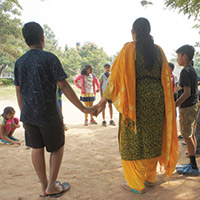Reflections on The Sacred Classroom Principles
 Given below are some anecdotes and experiences in the classroom on the application of the Sacred classroom principles:
Given below are some anecdotes and experiences in the classroom on the application of the Sacred classroom principles:
Unconditional love
Radha: A child in our kindergarten would often pinch and hit other children and disturb other children at work. We set clear boundaries, however, at the same time, we accepted him unconditionally and gave him love. This helped him accept the boundaries we set for him with ease. He felt secure that he was loved by the adults in class, come what may. A year later, the child’s misbehavior is already a matter of the past. The child has become a very conscientious member of the class.
Awareness
Aparna: Two students in the 5th and 6th grades, who were gearing up for a sleepover, excitedly announced that they were also leaving early from school. As I was not aware of this, I asked them with concern if the Front Office had been informed by their parents, at the least. Pat came the response that some other teacher already knew. Feeling aware of my discomfort, I looked within and realized that as a class pillar I needed to have been informed, especially if there was an early departure. I took a sacred pause, and approached the students again this time with clarity and expressed the need for me to have received communication from the parents to ensure safety for them at school and a healthy respect for myself
Abundance
Radha: There is an abundance of time for the children to develop socially and skillwise. This awareness helps teachers to trust the child’s pace and move beyond a scarcity mindset. The teacher then is not unconsciously worried about the child not learning a skill at the same pace as the rest of their friends. This brings ease for all! For 2 years in kindergarten, a child only wanted to draw for a majority of time, showing no visible interest in reading or other activities in the class. Today after 4 years, the child is a voracious reader!
Respect
Radha: The most important foundation for a fruitful relationship with anyone is Respect. This is true of a teacher-child relationship too. Any child can sense when he/she is respected and they spontaneously warm up to the adult, trusting the adult wholly. When the child does this, there starts a most deeply harmonious relationship.
Mirroring
Radha: Challenges are really gifts for us to overcome an impediment – Facing them, we can uncover our true essence and spread the fragrance of the same in the world around.
That really feels like an insurmountable challenge, is an area of growth for us. The journey is sometimes, victimhood > blame > anger > sadness. To catch one’s self when one is in any one of these steps and to introspect and take the right step is really the art of learning from challenges. Honesty and a deep desire to introspect and grow while dropping the ego are the only prerequisites.
At one point, I was triggered by a situation with a child. With a little more awareness, I realised that similar emotions came up with my child at home too. The attention shifted to what in me caused this and I worked inwards. What in me was being mirrored outside came in to focus!
Learning from challenges
Aparna: I had inhibitions on how to meaningfully and fruitfully work with a child. In the beginning, I was
searching for suitable ways in which I could address the use of inappropriate language, conflicts or even express my disappointment effectively when he arrived late into class despite many reminders. I felt helpless and challenged as a teacher. Even though I received plenty of support from my co-teachers, it bothered me as I was not able to support myself. Through reflections, one important point came to my awareness… I was not being firm with the kid with respect and I was falling into the trap of judging them. I became aware that the child needed safety and respect as an individual, while at the same time feeling comfortable belonging to a group. Through small steps that I regularly practice, I have been striving to create a safe environment for both of us. I am now able to interact with this child freely and vice versa.
Dropping the ego
Radha: The child may not be interested in a carefully created Lesson Plan. The reasons may be varied – the
child not being ready for the lesson, the child may be interested at something else that is over-riding at that
time and so on. At times like this, the teacher has to drop the ego attachment to the lesson and follow the child.
Aparna: In my second year of teaching at Creative, I intervened to help a child who was having a conflict with another. She refused my help and said a few words which I took personally – I was hurt and shocked. My awareness on where I was stuck came only later, during a wisdom circle. When the child refused my help, my ego was hurt and I perceived it as ‘rejection’. Through journaling and a deep listening exercise, I understood the child’s perspective – she needed my help but only in presence and as a loving listener. Dropping my ego, I could clearly see that the child has the strength to face any situation and move on.
Radha is the Early Childhood coordinator. She is a post graduate in Analytical Chemistry and is an AMI trained Montessori teacher. Radha has trained under Dr. Newton Kondaveti, Jayashree, and Leonard Orr with Past Life, Inner Child Healing, EFT, NVC, and Breathwork. Understanding the connection of the mind to the body has been a big learning for her.
radha.ghanagam@thecreativeschool.org

